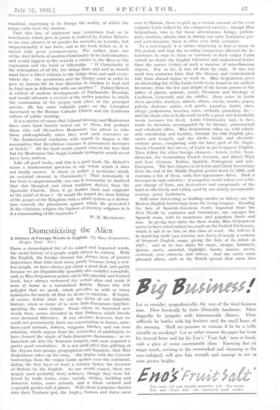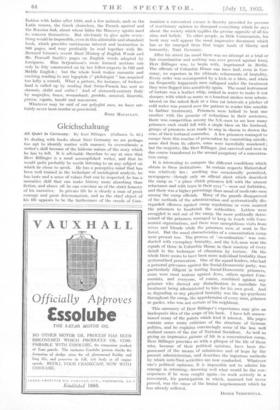Domesticizing the Alien
A History of Foreign Words in English. By Mary Serjeantson. (Kegan Paul. 21s.)
FROM a chronological list of its coined and imported words, the social history of a people might almost be written. With the English, the foreign element has always been of greater importance than with most races, partly because, being a rest- less people, we have always got about a good deal, and partly because we are linguistically (possibly also socially) xenophile, and, as Miss Serjeantson points out in this agreable and learned book, have always welcomed the verbal alien and made it soon at home as a naturalized Briton. Hence this rich polyglot that we speak, which provides us with so many synonyms for nearly all that we desire to mention. It began, of course, before what we call the dawn of our linguistic history, when so many of us were Indo-Europeans together, speaking the same tongue. From whom we borrowed new words then, seems shrouded in that darkness which broods over deceased illiterates. It was obvious, however, that we could not permanently limit our conversation to horses, mice, farm-yard animals, ladders, waggons, birches, and our near relations, which appear from the researches of philologists to have formed the staple of Indo-European discussions ; so we launched out into the Teutonic tongues, and soon acquired a pretty good vocabulary. It is not until after this splitting of the Aryans into groups, geographical and linguistic, that Miss Serjeantson takes up the story. She begins with the German borrowings from the vulgar Latin spoken over the continent, dating the first layer at least a century before the invasion of Britain by the English. As one would expect, these are largely (and probably first) military, though they were fol- lowed by trade terms, coins, metals, 'Clothes, building and domestic terms, some animals, and. a whole orchard and vegetable garden full of plants. With these Latinisms thrown into their Teutonic pot, the Angles, Saxons and Jutes came
over to Britain, there to pick up a certain amount of the even vulgarer Latin talked by the conquered natives ; though Miss Serjeantson, who is, for those adventurous beings, philolo- gists, cautious, admits that in dating our early Latinisms pre- and post-invasion, there is often very little certainty.
To a non-expert, it is rather surprising to find so many in this period, and that the invading conquerors allowed the in- habitants to chat to them so variously in their vulgar Latin (which no doubt the English tolerated and understood better than the native Celtic) of such a number of miscellaneous objects. For so far, it was all done by chat. It was not until two centuries later that the literary and ecelesiaitical tide from abroad began to wash in. Miss Serjeantson gives an interesting list of the Latin words to be found in our earliest literature, from the few and simple of the heroic poems to the influx of plants, animals, music, literature and theology of Caedmon, Cynewulf, and the riddles. Here enter in Latin dress apostles, martyrs, abbots, altars, creeds, monks, popes, priests, deacons, saints, evil spirits, paradise, faults, alms, clergy, godparents, heretics, mass, sabbath, preaching, Sre.— and'the draca who is in Beowulf merely a great and formidable worm becomes the devil. Latin Christianity had, in fact, made its invasion, accompanied by its literary, grammatical and scholastic allies. Miss Serjeantson takes us, with admir- able scholarship and lucidity, through the Old English glos- saries and Gospels, and the ninth-, tenth- and eleventh- century prose, completing with the later part of the Anglo- Saxon. chronicle her survey of Latin in pre-Conquest English. Then follow the other foreign. elements--Greek, Celtic, Scan- dinavian, the tremendous French invasion, and (later) High and Low German, Italian, Spanish, PortugueSe and non- European. The last chapter is on Latin and Greek borrowings from the end of the Middle English period down to'1899, and contains a list of these, with 'first:appearance dates. SUch a list must be only selective ; it comprises words taken over with- out Change of form, not derivatives and compounds, of the kind so effectively and widely used by our stately seventeenth- century prose Latinizers.
Still more interesting as holding candles to history are the Modern English borrowings from the living tongues. Reading the lists of Spanish-American words imported from the New World by explorers and translators, one voyages the Spanish main, with its monstrous and populous lands and seas. In giving first dates for these words, Miss Serjeantson seems to have relied rather too much on the Oxford Dictionary, which is apt to be late on this class of word. She follows it in depriving turtle (sea tortoise, not dove) of nearly a century of frequent English usage, giving the date of its debut as 1657 ; and in its late dates for canoe, cacique, hammock, iguana, maize, cannibal, troglodyte, bonito, manioc, sierra, cochineal, coca, estancia, and others. And she omits some pleasant aliens, such as the Dutch sprunk that came into fashion with ladies after 1688, and a few animals, such as the Latin remora, the Greek chameleon, the French squirrel and the Russian loch, about whose hides the Muscovy agents used to concern themselves. But obviously to give quite every- thing would be impossible, even in this admirable and abundant book, which provides Continuous interest and instruction in 300 pages, and may profitably be read together with Mr. Bernard Groom's recent Short History of English Words and Mr. Pearsall Smith's pages on English words adopted by foreigners. Miss Serjeantson's more learned sections can only he fitly commented on by her fellow-experts in Old and Middle English ; but the whole book makes romantic and exciting reading to any logophile (" philologist " has acquired too lofty a sound). What a picture, for instance, of Switzer- land is called up by reading that Swiss-French has sent us chamois, cialet and cretin ! And of sixteenth-century Italy by magnifico, bravo, mountebank, gondola, carnival, lazaretto, piazza, regatta, bandit and maccaroni.
Whatever may be said of our polyglot race, we have cer- tainly never been insular or provincial.
ROSE MACAULAY.











































 Previous page
Previous page